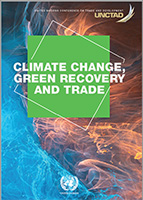
This COVID-19 crisis is unprecedented not just in terms of the impact it has had so far but in the kind of new or next normal that is going to come in its aftermath. The role of the state in the economy is being altered in practice because of the rescue and recovery programmes. These programmes are extraordinary in scale and in scope and could prove decisive for the world’s low-carbon transition.
In the past, government intervention has already proved transformative, creating entirely new markets, including for the internet, nanotechnology, biotechnology, and clean energy. Green recovery will require the same level of strategic investment and partnership, except this time it is to solve environmental, not only technological, problems.
Green stimulus packages provide a demand-side pull for the ICTs, leading to a constant increase in the proportion of intangibles in production and in consumption. The pandemic is shifting the economy to a low-contact, or low-touch modes, with health safety becoming a defining concern. Services claim an increasing share in value chains, with consequent changes to the channels and forms of international trade and a dramatically different trade-climate equation.
An important open question is to what extent green recovery and the expanded role of state will change our perceptions about trade policy, particularly regarding the overly sensitive issues: subsidies, border carbon adjustments, local content requirements and climate finance.
As pandemic stricken industries seek emission leniency and oncoming subsidies are set to skew competitiveness, plans for the deployment of border carbon adjustments are being set in motion. Countries are aggressively re-evaluating near-shore and on-shore options and supply chain conditionalities. Companies make claims of carbon neutrality, while it is not entirely clear what will carbon markets mean when everybody needs to be net-zero.
Addressing these and other, related issues will require a change in mind set, from one centered on market access to one embracing market creation. The point is not to be for free trade, nor to be against free trade per se, but to ensure that countries do not fall victims to their own rules and can prepare for a different economy post-COVID by allowing goods, services and technologies to move into new businesses and sectors.
For the developing countries, green recovery is a particularly difficult proposition. Recovery plans deemed green are almost entirely domestic and of little help to poorer countries trying to recover from the economic fallout of COVID-19. There is a danger that the stimulus packages widen global inequality and push poorer countries to turn to fossil fuels.
The priority for climate and trade policies is to build effective cooperation, with the necessary financial and technology transfers to ensure acceptability for developing countries. UNCTAD is well positioned to promote such cooperation in several areas.
UNCTAD has a role to play in facilitating evidence-based dialogues between trade and climate policy makers and negotiators on the overly sensitive issues of subsidies and border carbon adjustments. While a lot of attention is being paid the legality of these measures, less is known about their economic and environmental effectiveness as well as their impacts on developing country exporters.
UNCTAD could host or participate in a coordinated effort to develop a body of competent, peer reviewable work on green subsidies, which might eventually lead to an international agreement on good practices and standards.
UNCTAD could help countries conduct assessments of and update and develop public policy frameworks vis-à-vis climate risks, mitigation options, circular economy models and strategic supplies in value chains.
UNCTAD’s background in carbon markets may prove instrumental in exploring options that go beyond the Kyoto type offsetting mechanisms and towards financing climate projects that truly drive sustainable development.
UNCTAD’s quadrennial conference – UNCTAD15 - is an opportunity to renew commitment to cooperation in pursuing a truly global green recovery, featuring debt cancelation, fossil fuel subsidy removal and greater investment in overseas renewables rather than fossil fuels. It could provide a platform for a political (ministerial) declaration outlining the important role of trade in pursuing a positive, proactive climate agenda and rebuilding support for international economic cooperation.




